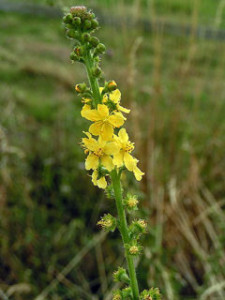Agrimonia eupatoria is a species of agrimony that is often referred to as common agrimony, church steeples or sticklewort.
The whole plant is dark green with numerous soft hairs. The soft hairs aid in the plant’s seed pods sticking to any animal or person coming in contact with the plant. The flower spikes have a spicy odor like apricots. In the Language of Flowers Agrimony means thankfulness or gratitude
Contents
Uses
- Agrimony is used for sore throat, upset stomach, mild diarrhea, irritable bowel syndrome (IBS), diabetes, gallbladder disorders, fluid retention, cancer, tuberculosis, bleeding, corns, and warts; and as a gargle, heart tonic, sedative, and antihistamine.
- Agrimony is applied directly to the skin as a mild drying agent (astringent) and for mild skin redness and swelling (inflammation). Some chemicals taken from agrimony are used to fight viruses.
Benefits
- Agrimonia has been used since ancient times. The Greeks used it as a remedy for ailments of the eye and the herb’s name is derived from the Greek word Argemone which means plant that heals the eye. In ancient Rome the great author and naturalist Pliny the elder deemed agrimony “an herb of princely authorite”. Anglo-Saxons used the leaves of this herb to help stop bleeding and heal wounds. Chinese medicine often used Agrimony to treat menstrual difficulties and during the middle ages this herb was used frequently as a sleep aid. In North America agrimony was used for a variety of ailments by Native Americans and up until the late 19th century agrimony was used throughout Europe and North America to treat skin conditions, cough, sore throat, and diarrhea.
Cautions
- Agrimony is POSSIBLY SAFE for most adults when used short-term. But large amounts of agrimony are POSSIBLY UNSAFE because agrimony contains chemicals called tannins.
Agrimony can make some people’s skin extra sensitive to sunlight and more likely to burn.Special Precautions & Warnings:
Pregnancy and breast-feeding: Agrimony is POSSIBLY UNSAFE during pregnancy because it might affect the menstrual cycle.
There is not enough reliable information about the safety of taking agrimony if you are breast-feeding. Stay on the safe side and avoid use.
Diabetes: Agrimony might lower blood sugar levels. People with diabetesshould monitor their blood glucose levels closely. If you have diabetes, it’s best to check with your healthcare provider before starting agrimony.
Surgery: Agrimony might affect blood sugar levels, so there is a concern that it might interfere with blood sugar control during and after surgery. Stop using agrimony at least 2 weeks before a scheduled surgery.
Interactions
Medications for diabetes (Antidiabetes drugs) interacts with AGRIMONY
Agrimony might decrease blood sugar. Diabetes medications are also used to lower blood sugar. Taking agrimony along with diabetes medications might cause your blood sugar to go too low. Monitor your blood sugar closely. The dose of your diabetes medication might need to be changed.
Some medications used for diabetes include glimepiride (Amaryl), glyburide (DiaBeta, Glynase PresTab, Micronase), insulin, pioglitazone (Actos), rosiglitazone (Avandia), chlorpropamide (Diabinese), glipizide (Glucotrol), tolbutamide (Orinase), and others.
Other names
Agrimone, Agrimonia, Agrimonia eupatoria, Aigremoine, Aigremoine Eupatoire, Church Steeples, Churchsteeples, Cockeburr, Cocklebur, Common Agrimony, Da Hua Long Ya Cao, Eupatoire-des-Anciens, Fragrant Agrimony, Francormier, Herba Agrimoniae, Herbe-de-Saint-Guillaume, Herbe de Sainte Madeleine, Philanthropos, Soubeirette, Sticklewort, Thé des Bois, Thé du Nord, Toute-Bonne
References
Source: WebMD, http://www.webmd.com/vitamins-supplements/ingredientmono-604-agrimony.aspx?activeingredientid=604&activeingredientname=agrimony
Wikipedia, https://en.wikipedia.org/wiki/Agrimonia_eupatoria
Herbwisdom, http://www.herbwisdom.com/herb-agrimonia.html

